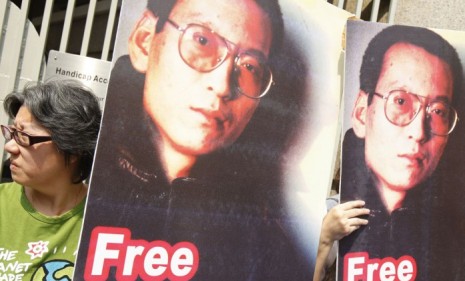Could a Nobel Peace Prize bring democracy to China?
Chinese human rights activist Liu Xiaobo has won the world's highest humanitarian honor — much to the dismay of his nation's Communist leaders

A free daily email with the biggest news stories of the day – and the best features from TheWeek.com
You are now subscribed
Your newsletter sign-up was successful
As widely predicted, Chinese dissident Liu Xiaobo has been awarded this year's Nobel Peace Prize for his nonviolent battle to improve human rights in his country. Just as predictable, perhaps, has been China's response to the award. The professor is currently serving an 11-year jail sentence in China for a pro-democracy manifesto he wrote in 2008, and the country's authorities condemned the Norwegian prize committee for rewarding a "criminal." The state-run media has blacked out the news and threatened sanctions against Norway. What could this mean for the state of democracy in China? (Watch the announcement)
Increased international attention will certainly help: There will be "increased attention" on China as a result of Liu's win, says Corinna-Barbara Francis, an Amnesty International spokesperson quoted in Voice of America. Now, the international community might focus on urging "change and progress in the way that the Chinese government treats individuals who are simply speaking out."
"China and the Nobel Peace Prize"
The Week
Escape your echo chamber. Get the facts behind the news, plus analysis from multiple perspectives.

Sign up for The Week's Free Newsletters
From our morning news briefing to a weekly Good News Newsletter, get the best of The Week delivered directly to your inbox.
From our morning news briefing to a weekly Good News Newsletter, get the best of The Week delivered directly to your inbox.
But there's too much money at stake for the West to act: There will be much "online comment" applauding Liu's win, says The Economist. Alas, the West's desire to profit from China's "rapid economic growth" will always trump our concern for "individual dissidents." The country may one day release Liu to "win plaudits from Western governments," but it will have nothing to do with pressure from us. While China's boom continues, it has plenty of "breathing space."
Still, it's symbolically important: Liu's Nobel Prize will not end the "relentlessness of everday authoritarianism" in China, says Gady Epstein in Forbes, but it will help transmit the "proud legacy" of the many disappeared dissidents who have been forgotten. "More people around the world and inside China will know what they all stand for, and for a time will remember them and their cause a little better." That's the true value of this prize.
"What Liu Xiaobo and the Nobel Peace Prize stand for"
A free daily email with the biggest news stories of the day – and the best features from TheWeek.com
-
 Political cartoons for February 15
Political cartoons for February 15Cartoons Sunday's political cartoons include political ventriloquism, Europe in the middle, and more
-
 The broken water companies failing England and Wales
The broken water companies failing England and WalesExplainer With rising bills, deteriorating river health and a lack of investment, regulators face an uphill battle to stabilise the industry
-
 A thrilling foodie city in northern Japan
A thrilling foodie city in northern JapanThe Week Recommends The food scene here is ‘unspoilt’ and ‘fun’
-
 The billionaires’ wealth tax: a catastrophe for California?
The billionaires’ wealth tax: a catastrophe for California?Talking Point Peter Thiel and Larry Page preparing to change state residency
-
 Bari Weiss’ ‘60 Minutes’ scandal is about more than one report
Bari Weiss’ ‘60 Minutes’ scandal is about more than one reportIN THE SPOTLIGHT By blocking an approved segment on a controversial prison holding US deportees in El Salvador, the editor-in-chief of CBS News has become the main story
-
 Has Zohran Mamdani shown the Democrats how to win again?
Has Zohran Mamdani shown the Democrats how to win again?Today’s Big Question New York City mayoral election touted as victory for left-wing populists but moderate centrist wins elsewhere present more complex path for Democratic Party
-
 Millions turn out for anti-Trump ‘No Kings’ rallies
Millions turn out for anti-Trump ‘No Kings’ ralliesSpeed Read An estimated 7 million people participated, 2 million more than at the first ‘No Kings’ protest in June
-
 Ghislaine Maxwell: angling for a Trump pardon
Ghislaine Maxwell: angling for a Trump pardonTalking Point Convicted sex trafficker's testimony could shed new light on president's links to Jeffrey Epstein
-
 The last words and final moments of 40 presidents
The last words and final moments of 40 presidentsThe Explainer Some are eloquent quotes worthy of the holders of the highest office in the nation, and others... aren't
-
 The JFK files: the truth at last?
The JFK files: the truth at last?In The Spotlight More than 64,000 previously classified documents relating the 1963 assassination of John F. Kennedy have been released by the Trump administration
-
 'Seriously, not literally': how should the world take Donald Trump?
'Seriously, not literally': how should the world take Donald Trump?Today's big question White House rhetoric and reality look likely to become increasingly blurred